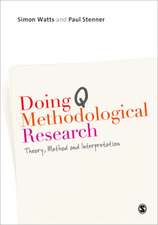Designing Social Research: A Guide for the Bewildered
Autor Ian Greeneren Limba Engleză Paperback – 12 apr 2011
Greener highlights key debates in the field - both philosophical and practical - and presents them in such a way that they remain constantly relevant to research practice of his readers. Coverage includes:
- Framing an effective research question/problem;
- Examining the jargon of social research;
- The links between theory, methodology and method;
- The role of literature reviewing in research design;
- Managing and planning the research process;
- Sampling;
- Qualitative designs;
- Quantitative designs;
- Mixed methods designs;
- Data analysis.
Designing Social Research will be ideal first reading for M-level students and undergraduates planning significant research projects for their dissertations. It will also be invaluable to first year PhD students considering how they will go about their research projects.
Preț: 375.67 lei
Nou
Puncte Express: 564
Preț estimativ în valută:
71.89€ • 74.60$ • 60.09£
71.89€ • 74.60$ • 60.09£
Carte disponibilă
Livrare economică 22 februarie-08 martie
Livrare express 11-15 februarie pentru 32.57 lei
Preluare comenzi: 021 569.72.76
Specificații
ISBN-13: 9781849201902
ISBN-10: 1849201900
Pagini: 224
Dimensiuni: 170 x 242 x 12 mm
Greutate: 0.4 kg
Ediția:1
Editura: SAGE Publications
Colecția Sage Publications Ltd
Locul publicării:London, United Kingdom
ISBN-10: 1849201900
Pagini: 224
Dimensiuni: 170 x 242 x 12 mm
Greutate: 0.4 kg
Ediția:1
Editura: SAGE Publications
Colecția Sage Publications Ltd
Locul publicării:London, United Kingdom
Cuprins
Introduction to Social Research Design - Or What Are You Talking About?
Introduction
Defining terms
Some general points about research questions
Some other general guidelines
Some practical examples of how questions, methods and philosophy combine
What's the problem, and how are you going to research it? A logic of appropriateness
Conclusion
Five things to remember about this chapter
Reviewing What Other People Have Said - Or How Can I Tell If Others' Research is Any Good?
Introduction
Nuts and bolts
The hierarchy of evidence
Reading efficiently and critically, and taking notes
So is the study any good?
Writing a review
Conclusion
Five things to remember about this chapter
Example - 'Qualitative research and the evidence base of policy'
Surveys and Questionnaires - Or How Can I Conduct Research With People at a Distance?
Introduction
The use of questionnaires - the best (and worst) of quantitative (and qualitative) social research
Surveys and questionnaires
Perspectives on questionnaires
Designing questionnaires
Open and closed responses
Getting questions really clear
Common response forms
Questionnaire design
Analysing and reporting questionnaire responses
Reflexivity and questionnaires
Contentious issues
Conclusion - working with the good and bad of questionnaires
Five things to remember about this chapter
Example - The Paradox of Choice
Elements of Quantitative Design: Sampling and Statistics - Or What Can I Do With Numbers?
Introduction
Numbers and their importance
What are numbers good for?
The philosophy of quantitative research
Sampling
Some issues in quantitative analysis - basic descriptive statistics
Conclusion
Five things to remember about this chapter
Example - Super Crunchers
Ethnography as a Research Approach - Or What Do I Gain from Watching People and Talking to Them?
Introduction
What is ethnography?
When would I want to use an ethnography?
What does it mean to conduct an ethnography?
Philosophical debates around ethnography
What do the differences in approach mean for the resulting ethnography?
What kind of research does an ethnographic research project produce?
How can you increase the chance of doing good ethnographic research?
Conclusion - getting close or producing useless knowledge?
Five things to remember about this chapter
Example - Reading Ethnographic Research
Dealing with Qualitative Data - Or What Should I Do With All These Words?
Introduction
The aims of qualitative research
Grounded theory, coding and generalisation
The mechanics of grounded theory
Discourse analysis and its variants
Quantitative approaches to textual analysis
Analysing documents
What are the criteria for a good qualitative analysis?
Truth in social research
Conclusion - finding appropriate methods for dealing with your data
Five things to remember about this chapter
Example - The Body Multiple
Causality in your research - or how deep should ontology go?
Introduction
Ontology and depth
Science, method and causality
Constant conjunction
The world is flat
Going deeper
Levels of analysis
Conclusion - how deep do you need to go?
Five things to remember about this chapter
Example - Rogue Traders and financial losses
Dealing With Time and Control - Or What Time Period Suits My Research, and How Do I Stop the World from Interfering in It?
Introduction
How does Social research deal with time?
Phenomenology and process philosophy - researching the present
History and political science - researching the past
What time frame fits your research, and how does time affect what you can say?
The openness (and closedness) of systems
A way around the problem of the experimental method - scale and sampling
What are case studies for - an aid to generalisation or an analysis of power and expertise?
Conclusion - time and control in social research
Five things to remember about this chapter
Example - accounts of the financial crisis
Ethics - Or What Practices are Appropriate in my Research? 142
Introduction
The importance of ethics in research
The official line - what bodies such as the ESRC have to say
Questioning the official line - or is it even possible to follow all these ethical principles?
The importance of balance and appropriateness in ethics
Different perspectives on ethics
Conclusion - doing what's right and doing what's ethical
Five things to remember about this chapter
Example - 'Teenagers telling sectarian stories'
Writing Up Your Research - Or What Can I Say I've Found?
Introduction
The differences between description, analysis and argument
Making an argument - what have you found out?
The bases of good arguments
Supporting a conclusion
Other concerns with arguments
Deductive and inductive arguments
Structuring a piece of writing to bring out your argument
Conclusion - writing up research so that it is clear to you (and to everyone else)
Five things to remember about this chapter
Writing up reviews and putting together proposals - or can you provide some examples of all of this?
Introduction
Putting together a literature review
The role of the literature review
Doing a literature review
Exclusion and systematic review
Exclusion and realist review
Putting together a research proposal
Conclusion - the skills of being a practising researcher
Five things to remember about this chapter
Conclusion - Or Getting on with Social Research
Introduction
Others' claims as a basis for your own work
Defining the job at hand
Designing research that is appropriate for the job at hand
Mixing methods
Being careful with data and with ethics
Writing it all up
Conclusion - doing research well
Example - Ladbroke Grove
Introduction
Defining terms
Some general points about research questions
Some other general guidelines
Some practical examples of how questions, methods and philosophy combine
What's the problem, and how are you going to research it? A logic of appropriateness
Conclusion
Five things to remember about this chapter
Reviewing What Other People Have Said - Or How Can I Tell If Others' Research is Any Good?
Introduction
Nuts and bolts
The hierarchy of evidence
Reading efficiently and critically, and taking notes
So is the study any good?
Writing a review
Conclusion
Five things to remember about this chapter
Example - 'Qualitative research and the evidence base of policy'
Surveys and Questionnaires - Or How Can I Conduct Research With People at a Distance?
Introduction
The use of questionnaires - the best (and worst) of quantitative (and qualitative) social research
Surveys and questionnaires
Perspectives on questionnaires
Designing questionnaires
Open and closed responses
Getting questions really clear
Common response forms
Questionnaire design
Analysing and reporting questionnaire responses
Reflexivity and questionnaires
Contentious issues
Conclusion - working with the good and bad of questionnaires
Five things to remember about this chapter
Example - The Paradox of Choice
Elements of Quantitative Design: Sampling and Statistics - Or What Can I Do With Numbers?
Introduction
Numbers and their importance
What are numbers good for?
The philosophy of quantitative research
Sampling
Some issues in quantitative analysis - basic descriptive statistics
Conclusion
Five things to remember about this chapter
Example - Super Crunchers
Ethnography as a Research Approach - Or What Do I Gain from Watching People and Talking to Them?
Introduction
What is ethnography?
When would I want to use an ethnography?
What does it mean to conduct an ethnography?
Philosophical debates around ethnography
What do the differences in approach mean for the resulting ethnography?
What kind of research does an ethnographic research project produce?
How can you increase the chance of doing good ethnographic research?
Conclusion - getting close or producing useless knowledge?
Five things to remember about this chapter
Example - Reading Ethnographic Research
Dealing with Qualitative Data - Or What Should I Do With All These Words?
Introduction
The aims of qualitative research
Grounded theory, coding and generalisation
The mechanics of grounded theory
Discourse analysis and its variants
Quantitative approaches to textual analysis
Analysing documents
What are the criteria for a good qualitative analysis?
Truth in social research
Conclusion - finding appropriate methods for dealing with your data
Five things to remember about this chapter
Example - The Body Multiple
Causality in your research - or how deep should ontology go?
Introduction
Ontology and depth
Science, method and causality
Constant conjunction
The world is flat
Going deeper
Levels of analysis
Conclusion - how deep do you need to go?
Five things to remember about this chapter
Example - Rogue Traders and financial losses
Dealing With Time and Control - Or What Time Period Suits My Research, and How Do I Stop the World from Interfering in It?
Introduction
How does Social research deal with time?
Phenomenology and process philosophy - researching the present
History and political science - researching the past
What time frame fits your research, and how does time affect what you can say?
The openness (and closedness) of systems
A way around the problem of the experimental method - scale and sampling
What are case studies for - an aid to generalisation or an analysis of power and expertise?
Conclusion - time and control in social research
Five things to remember about this chapter
Example - accounts of the financial crisis
Ethics - Or What Practices are Appropriate in my Research? 142
Introduction
The importance of ethics in research
The official line - what bodies such as the ESRC have to say
Questioning the official line - or is it even possible to follow all these ethical principles?
The importance of balance and appropriateness in ethics
Different perspectives on ethics
Conclusion - doing what's right and doing what's ethical
Five things to remember about this chapter
Example - 'Teenagers telling sectarian stories'
Writing Up Your Research - Or What Can I Say I've Found?
Introduction
The differences between description, analysis and argument
Making an argument - what have you found out?
The bases of good arguments
Supporting a conclusion
Other concerns with arguments
Deductive and inductive arguments
Structuring a piece of writing to bring out your argument
Conclusion - writing up research so that it is clear to you (and to everyone else)
Five things to remember about this chapter
Writing up reviews and putting together proposals - or can you provide some examples of all of this?
Introduction
Putting together a literature review
The role of the literature review
Doing a literature review
Exclusion and systematic review
Exclusion and realist review
Putting together a research proposal
Conclusion - the skills of being a practising researcher
Five things to remember about this chapter
Conclusion - Or Getting on with Social Research
Introduction
Others' claims as a basis for your own work
Defining the job at hand
Designing research that is appropriate for the job at hand
Mixing methods
Being careful with data and with ethics
Writing it all up
Conclusion - doing research well
Example - Ladbroke Grove
Descriere
Enabling both students and researchers to fully explore the range of research approaches available, this guide demystifies the process of setting up a research study and is ideal as a starter book in research design.








